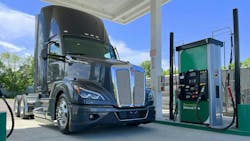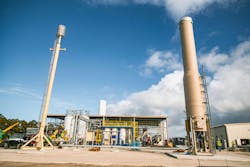The decision for a fleet to choose between either compressed natural gas (CNG) or renewable natural gas (RNG) comes down to sustainability and economics, according to David King, product manager for natural and renewable gas engines at Cummins. He noted RNG can offer even more benefits, especially when used to compliment a fleet using natural gas anyway.
But before deciding which (or both) fuel methods to use, it helps to understand some of the key benefits to CNG and RNG.
1. Sustainability
“Fleets with internal ESG goals, such as a low-carbon initiative, are drawn to natural gas,” King said. In some instances, a client pushes their freight carrier to begin utilizing low-carbon fuels. Whatever the motivating factor, CNGis a much “cleaner” alternative to diesel.
According to data presented by The Transport Project, combusting natural gas produces 27% fewer CO2 emissions than diesel on an energy-equivalent basis. Furthermore, modern natural gas engines often reduce NOx by 95% over current standards, and particulate matter (PM) by 90%. Additionally, CNG in heavy-duty vehicles has 13-17% fewer greenhouse gas (GHG) emissions compared to diesel on a well-to-wheel basis. That well-to-wheel GHG footprint grows even smaller when a fleet is able to use renewable natural gas. RNG is made from gases captured from places like landfills, wastewater treatment plants, and even farms.
2. Economics
King said natural gas has generally been a lower, more stably priced fuel compared to diesel.
To King’s point, the most recent retail fuel price data published at the Alternative Fuels Data Center website shows that CNG was running about 10% (33 cents) cheaper per diesel gallon equivalent (DGE) in October 2024. Back in October 2023, the difference was 29% ($1.17).
Keep in mind that fuel economy is lower when combusting natural gas, simply due to the fact that natural gas has to be spark-ignited. How much fuel economy is lost depends on duty cycle and other factors. King said it could land anywhere from 5 to 20%. The Transport Project pinpoints it in the 7 to 12% range.
So how does all of this pencil out for a fleet?
As an example, let’s use a 10% loss in fuel economy, a fuel price difference of $1 per DGE, and a 50,000-mile driving range. A Class 8 CNG truck getting 6.3 mpg will spend 17% less on fuel than a diesel truck getting 7 mpg.
“Even with the higher upfront vehicle acquisition price for a CNG truck, the fleet will get payback on that investment over the last few years of the truck’s lifecycle,” King said. “And the more fuel that truck burns, the more the fleet saves.”
Turning garbage into fuel: The case for RNG
One benefit of natural gas is the fact that it’s a domestically produced fuel. In the U.S., natural gas is produced from shale and other types of sedimentary rock formations through a process commonly known as fracking. While natural gas is a cleaner fuel that produces significantly fewer tailpipe emissions, there are some well-to-wheel emissions associated with the extraction, production, and distribution of this alternative fuel.
Renewable natural gas, on the other hand, doesn’t require the earth to be fractured to harvest the fuel. RNG captures gases emanating from places like landfills, wastewater treatment plants, and sometimes farms. That results in significantly fewer emissions from the production process, which helps lower the total carbon footprint even better than conventional natural gas does.
Companies like Nopetro Energy are helping bring RNG to the marketplace. RNG is piped into the same pipeline as conventional natural gas. The two can be mixed because they are chemically identical. For a fleet, that means they can run RNG through the same CNG engines and vehicles they already have.
“RNG not only brings environmental benefits, but also financial savings,” said Jorge Herrera, CEO of Nopetro Energy, a provider of alternative fuel solutions including RNG and LNG, hydrogen, and Nopetro E+ renewable electricity. “RNG is also a renewable fuel that’s helping cure a societal problem. Society is not going to stop producing waste. That waste will continue to accumulate in landfills. RNG helps cure that problem, while also turning that waste into a usable commodity for transportation in a way that’s scalable.”
Nopetro Energy has 15 production facilities across Florida. Those facilities capture the biogas (biomethane) escaping from landfills, etc., and clean and refine it so it’s indistinguishable from conventional natural gas. The company’s newest facility in Vero Beach is in partnership with the Indian River County Solid Waste Authority.
About the Author

Gregg Wartgow
Gregg Wartgow is a freelancer who Fleet Maintenance has relied upon for many years, writing about virtually any trucking topic. He lives in Brodhead, Wisconsin.

